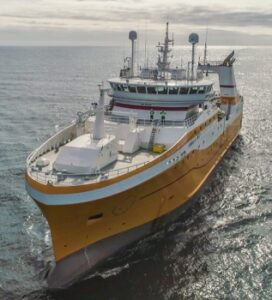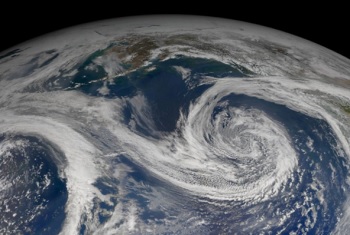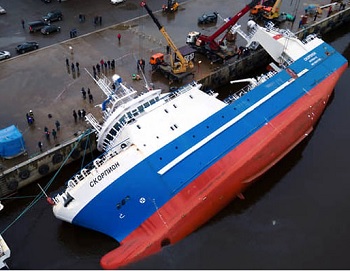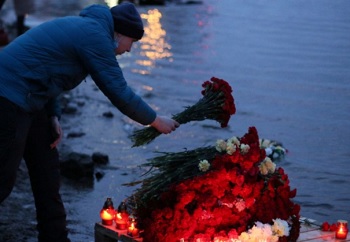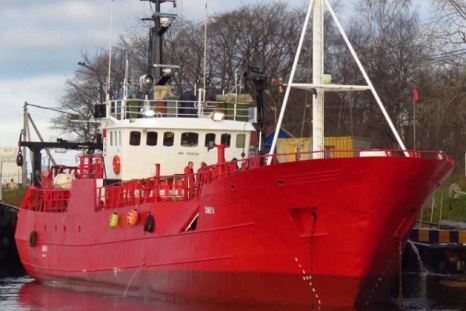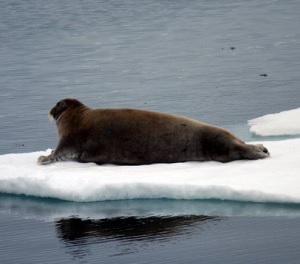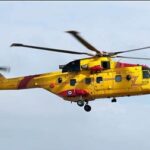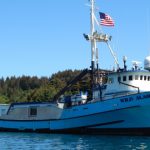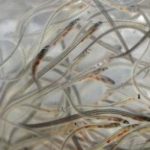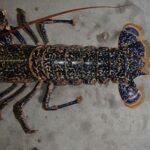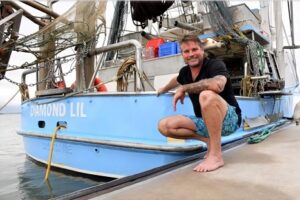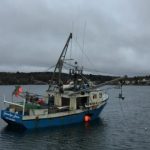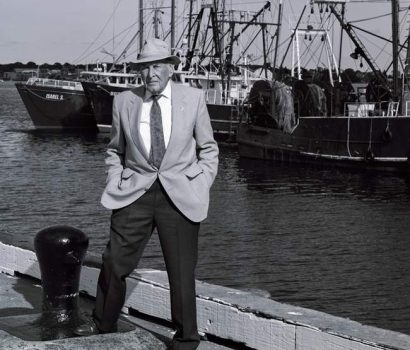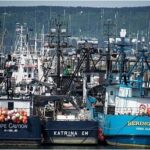Tag Archives: Russia
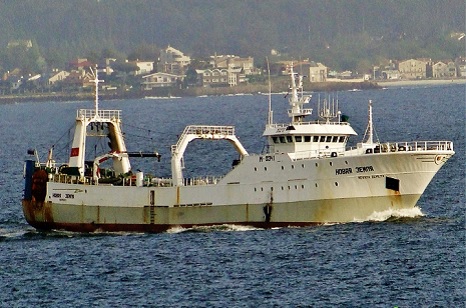
Russian head of NAFO has stepped down; country must be expelled/fish quotas transferred to Ukraine
Seaward Enterprises Association of Newfoundland and Labrador (SEA-NL) says it’s not enough that the Russian president and chair of the international organization that manages fish stock inside and outside Canada’s 200-mile limit has stepped down. The Russian Federation itself must be expelled from the Northwest Atlantic Fisheries Organization, with the country’s thousands of tonnes of quotas transferred to the Ukraine, another member of the 13-country organization. “Russia has violated every protocol on the face of the earth with its war on Ukraine, and its membership in NAFO should be cancelled outright, and its fish quotas transferred,” says Ryan Cleary, SEA-NL’s Executive Director. “Russian seafood is banned around the world, so it stands to reason that its offshore dragger fleet should not be permitted to fish as a NAFO-member country.” >click to read< 11:50
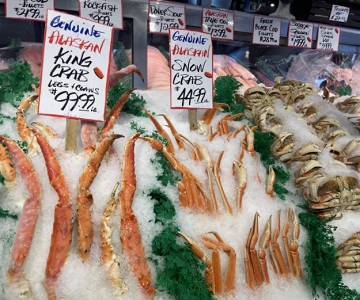
Trade war, Covid and now Ukraine invasion eat into Alaska seafood sales
First a trade war, then a battle against an infectious virus and now a real war are all affecting Alaska seafood exports. Shipments to China fell from as high as 30% of Alaska’s total seafood export value in the 2010s to 20% in 2020. “The U.S.-China trade war has displaced $500 million of Alaska seafood,” And though people bought more seafood to prepare at home during the COVID-19 pandemic, sales to restaurants and food services fell by 70%, Woodrow said. The food service market “still hasn’t fully recovered.” The Alaska product at risk in Russia’s invasion of Ukraine is pink salmon roe. Eastern Europe is a major buyer of the product, he said. “It’s a regional preference.” Alaska in 2021 shipped to Ukraine about $20 million of pink salmon roe,,, >click to read< 11:37
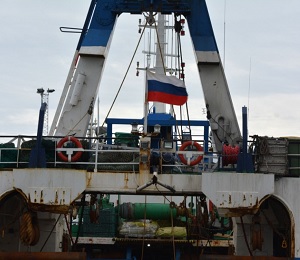
Massachusetts Seafood Collaborative calls for sanctions on Russian fish imports
The Boston-based Massachusetts Seafood Collaborative, which has several Gloucester members, is calling for sanctions to take a bite out of Russian fish imports because of the war in Ukraine. The collaborative, which counts the Gloucester Fishermen’s Wives Association as a member, said that in 2021, the U.S. imported $4 billion worth of Russian fish for processing, leading directly to jobs and paychecks for Massachusetts residents. “Though Russia blocks imports of American fish,” the collaborative said, “our commitment to free trade and open markets allowed this one-sided relationship to bear fruit. The invasion of Ukraine by Russia has forced our industry and our nation to decide between our ideals and our wallets.”>click to read< 08:42

Scottish officials ordered to withdraw from fishing talks with Russia
The Scottish Government has said it will not take part in any fisheries negotiations with the Russian Federation in the wake of the invasion of Ukraine. Environment Secretary Mairi Gougeon has instructed Scottish Government officials to withdraw from any such negotiations until further notice. She confirmed the move as she called for talks over fish stocks involving both the UK and Russia to be postponed. >click to read< 11:22
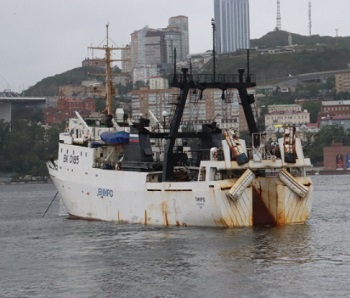
Despite Ukraine invasion, the U.S. and Russia are still working together to solve salmon mysteries
Tensions continue to simmer between Moscow and Washington in the wake of Russia’s invasion of Ukraine. In many respects, the divide between East and West is deepening: Oil companies are canceling partnerships with Russian firms. State legislators are calling for the state’s sovereign wealth fund to dump Russian investments. President Joe Biden announced Tuesday the U.S. would close its airspace to Russian aircraft. But the United States and Russia are continuing to work together on at least one issue: salmon. >click to read< 10:10
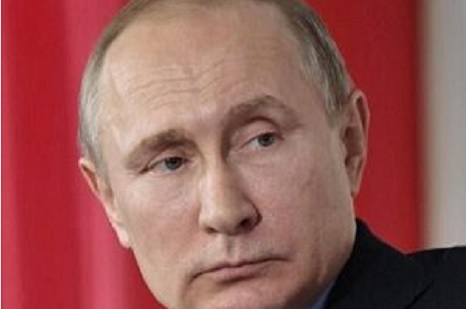
Should Russia be kicked out of NAFO; its trawler fleet banned from fishing outside Canadian waters?
There’s a case for it considering Canada has closed its airspace to Russian aircraft, and even a call by hockey legend Wayne Gretzky for Russia to be banned from the rescheduled World Juniors this summer in Alberta as a consequence for the country’s invasion of Ukraine. Offshore trawlers from the Russian Federation have access to thousands of tonnes of quota a year in the NAFO zone, including redfish, turbot, and skate. Kicking Russia out of NAFO and banning its offshore draggers from the area (if that’s possible), could be another message to President Vladimir Putin that his invasion of the Ukraine is unacceptable. Below are the NAFO quota tables for 2022, including a breakdown of fish set aside for Russia. >click to read< 09:34
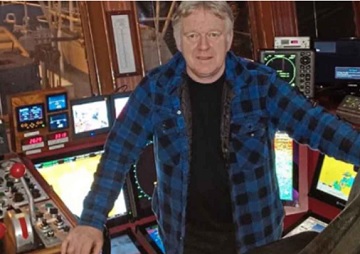
Cork fishermen reveal concerns over Russian submarines as they head off to sea
Kenny Oates, captain of the F/V Anders Nees, headed to sea last night with his six crew members for their first expedition of 2022 in search of hake, which swim close to the ocean floor. But Mr Oates admitted he is concerned that Russian subs could get caught in deep-sea fishing nets and pull down a trawler. He said: ‘We have seen it happen in Ireland, we have seen it happen in Scotland. It makes all fishermen very, very nervous.’ ‘You have all these international war games going on at sea and the fishermen are just trying to do their job, not knowing what is really going on,’ he said. >click to read< 09:09
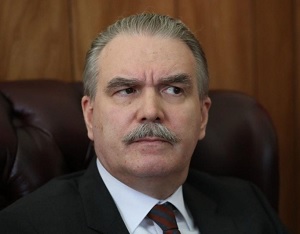
Updated: “Absolute Guarantee” – Wait! There is no Guarantee!
Irish fishing industry meets Russian ambassador over planned naval exercises -Representatives of Ireland’s fishing industry have been issued with an “absolute guarantee” by Russia’s ambassador that their work will not be impacted by Russian naval exercises scheduled for next week. The Irish government confirmed on Sunday that Russia plans to conduct naval and air exercises 240 kilometres off the southwestern coast of Ireland in international waters that lie within Ireland’s exclusive economic zone. >click to read< 07:30
Russians deny fishermen’s claims on naval drills ‘buffer zone’ – In a statement on Friday morning, the Russian Embassy rejected reports based on the statements from the fishing representatives on Thursday that there had been “some kind of ‘agreement’ on some kind of ‘buffer zones’ in the area of the upcoming drills of the Russian Navy in the Atlantic.” >click to read< 08:28
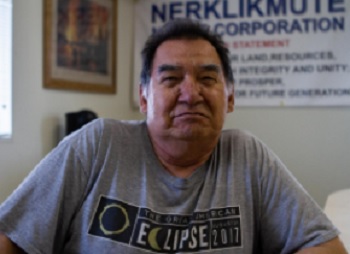
Why Are The Chum Runs So Low? It’s not just an Alaskan/Yukon phenomenon.
The State of Alaska has closed fishing for chum to protect the runs. For Yukon River families, chum is particularly important. Chinook salmon have been low for decades, but chum were the fish families could depend on until last year, when the summer chum run dropped below half of its usual numbers. This year the run dropped even further, to record lows. Biologist Katie Howard with the Alaska Department of Fish and Game said that the chum declines are not just occurring in the Yukon River. “When we talk to colleagues in the lower 48 and Canada, Japan, Russia, they are all reporting really poor chum runs. So it’s not just a Yukon phenomenon. It’s not just an Alaska phenomenon, but pretty much everywhere,” So why are the chum numbers so low? The short answer is no one really knows for sure. >click to read< 10:38
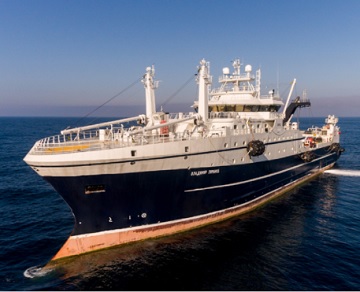
Russian Fishery Company’s flagship supertrawler F/V Vladimir Limanov arrives in Vladivostok port
After successful fishing trials, the flagship supertrawler “Vladimir Limanov” owned by the Russian Fishery Company arrives in Vladivostok for scheduled customs clearance and presentation to the Russian Maritime Register of Shipping, RFC says in its press release. During the voyage, F/V “Vladimir Limanov” underwent a number of inspections to determine the efficiency and reliability of the new vessel in real operating conditions. Leading Russian and Japanese food companies have already appreciated the first batches of high-quality products. The vessel is ready for operation and can set out on a fishing voyage. >click to read< 18:54
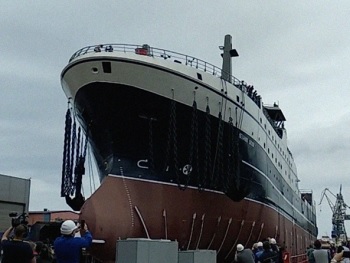
State of the art super trawler Mekhanik Sizov launched in Russia
The Admiralty Shipyards, located in St. Petersburg, have been the scene this Sunday of the launching ceremony of the super trawler of last generation Mekhanik Sizov. The ceremony, held during the day of Russian Navy Day, was attended by the country’s president, Vladimir Putin. Ships of this type measure 108 meters in length and 21 meters in beam. In addition, they have warehouses of 5,500 cubic meters. The ST-192 project ships reach a speed of 15 knots (almost 28 kilometers per hour), while their autonomy allows them to remain in the open sea for 45 days with a crew on board up to 139 members. photo, gif, >click to read< 13:21
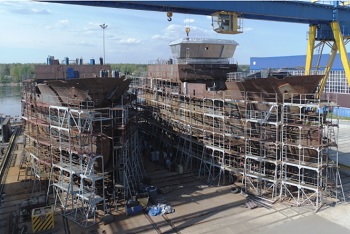
Crab Goes to Auction Again
Russia’s Federal Agency for Fisheries has rolled out plans to run a second round of crab quota auctions. This is not likely to happen soon, as among other reasons, because there is simply no capacity to build crabbers in Russia’s Far East. ‘Federal Agency for Fisheries is working on the second round of crab auctions,’ confirmed the Agency’s director Ilya Shestakov, adding that just like during the first round, quotas are planned to be sold with “investment liabilities.” It is estimated that the first-round winners embarked on the construction of 35 crabbers with a total value of 57.4 billion rubles ($800 million). >click to read< 13:50
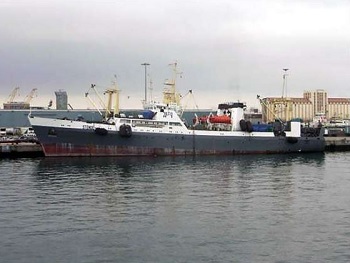
Fish Trawler With Over 80 People On Board Has Caught Fire In Sea Of Okhotsk
A fish trawler with over 80 people on board has caught fire in Russia’s Sea of Okhotsk, there is no threat of sinking, according to preliminary information, a spokesman for the regional emergency services told Sputnik on Thursday. “The burning trawler is around 200 kilometers [124 miles] away from Magadan, the holds of the vessel are in flames,” the spokesman said, adding that there are over 80 people on board. No injuries have been reported so far, the spokesman went on to say. >link< 21:18
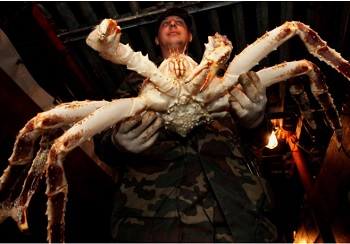
Russia’s wealthiest official arrested over links to ‘Crab King’ murder & smuggling cases
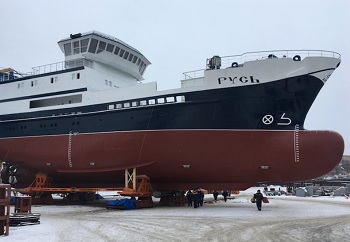
Russia Sells Deep Sea Crab Quota
On the fourth attempt, the Russian government has found a fishing company willing to buy deep-sea crab quotas, but Far Eastern fishermen expect this will be a hollow victory. Deep-sea crab quotas have been a headache for the Russian authorities for the past year. The Federal Agency for Fisheries ran three auctions since October of 2019, but each time with no bidders. The idea of selling crab quotas through auctions have been consistently criticised by Russian fishermen, as wreaking havoc on the entire industry. >click to read< 12:28
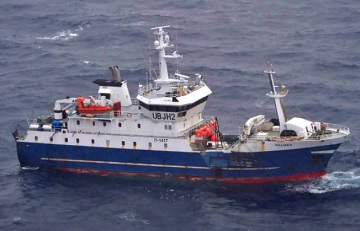
Russia and NZ in ‘knock out brawl’ over fishing vessel in protected Antarctic waters
Russia has accused New Zealand of falsifying evidence in a diplomatic clash over illegal fishing in protected waters around Antarctica. New Zealand and many allies rejected the accusation,,, On January 19 last year, a routine New Zealand surveillance flight over the Southern Ocean spotted a Russian-flagged ship called FV Palmer fishing in a marine protected area where fishing is banned by international agreement. The Palmer’s satellite tracker, officially called a “vessel monitoring system” ,or VMS, indicated the vessel was about 800 nautical miles (1500 kilometres) from that spot. >click to read< 15:44
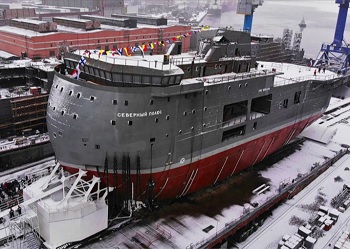
Russia’s New Long-Endurance Arctic Research Vessel Might Be The Ugliest Ship We’ve Seen
The Admiralty Shipyard in Saint Petersburg, which is part of Russia’s United Shipbuilding Corporation, launched the North Pole on December 18, almost exactly two years after construction began. The vessel has been built for the Federal Service for Hydrometeorology and Environmental Monitoring, better known as Roshydromet, at a reported cost of $100 million. It is being run as a joint project between Roshydromet and Russia’s Arctic and Antarctic Research Institute. Measuring 276 feet long by 74 feet wide, and with a displacement of 10,225 tons, the North Pole is intended to be the first vessel of its kind to be permanently based in the high Arctic. photos, >click to read< 18:34
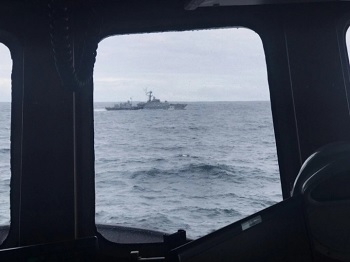
‘Are We Getting Invaded?’ U.S. Fishing Boats Faced Russian Aggression Near Alaska
Capt. Steve Elliott stood dumbfounded on the trawler Vesteraalen as three Russian warships came barreling through, barking orders of their own. On the ship Blue North, commands from a Russian plane led Capt. David Anderson to contact the U.S. Coast Guard, wondering how to protect his crew of 27.,, “The Coast Guard’s response was: Just do what they say.” This summer, Russia’s military operated in the Bering Sea, home to America’s largest fishery, where boats haul up pots crawling with red king crab, and trawlers dump nets filled with 200 tons of pollock onto their decks. >click to read< 18:26
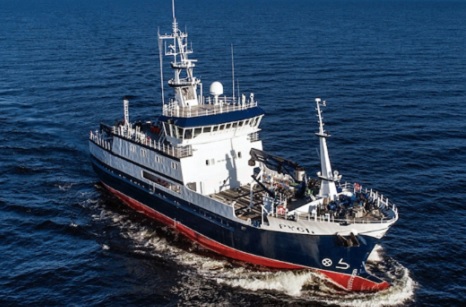
New Russian Crab Fleet Takes Shape
Following the delivery of Rus, Pella is making progress on two more crabbers to the same design, ordered for Sakhalin-based company Ostrovnoy-Krab. In the Far East, the Nakhodka Ship Repair Yard has contracted to build eight crabbers to a design developed by Damen – six for Antey and two for the Pacific Fishing Company (TRK). The first three of this series of crabbers designed to land fresh catches are scheduled to be in the water before the end of this year, with the series as a whole to be completed between 2021 and 2024. >photo’s, click to read< 16:27
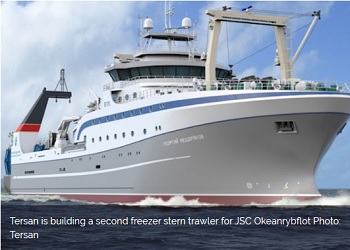
Tersan Shipyard has signed a new contract for a second freezer stern trawler
The new vessel will be among the world’s largest purpose-built factory trawlers and will trawl Alaska pollock in the Sea of Okhotsk, as well as herring, mackerel and pollock in the Pacific. The vessel is arranged for pelagic and semi-pelagic trawling, using two main trawl winches working in combination with ice trawl gallows and four large pelagic sweep line drums. The Skipsteknisk designed vessel will be 108 by 20 metres with accommodation for up to the 150 people on board,,, >click to read< 16:25
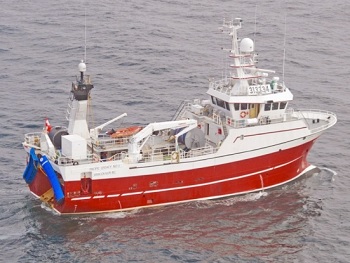
International Scientific Expedition to probe Pacific salmon survival
“While we recognize that ocean and climate conditions are major factors regulating salmon abundances, the mechanisms regulating abundances in the ocean are not known,” B.C. scientists Richard Beamish and Brian Riddell,, Scientists are seeking to provide more accurate forecasts of salmon returns during what Beamish and Riddell say might be the most difficult time in recent history for stewardship of Pacific salmon.,, The survey takes place as B.C. fishermen fear disastrous returns this year following poor returns for much of the coast last year. >click to read< 18:56
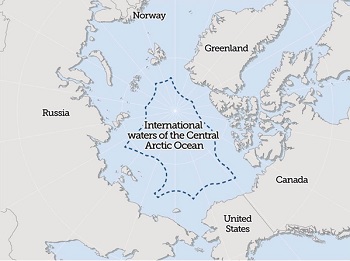
U.S. ratifies The Agreement to Prevent Unregulated High Seas Fisheries in the Central Arctic Ocean
The United States has become the fourth jurisdiction after Canada, the European Union and Russia to ratify a landmark international agreement that aims to prevent unregulated commercial fishery in the high seas of the Central Arctic Ocean, officials at the State Department announced Tuesday. The Agreement to Prevent Unregulated High Seas Fisheries in the Central Arctic Ocean, which was signed in Ilulissat, Greenland last October, includes the so-called Arctic Five – Canada, Norway, Russia, Denmark (Greenland and the Faroe Islands), the U.S. – as well as the major fishing nations – Iceland, Japan, South Korea, China and the EU. >click to read< 17:56
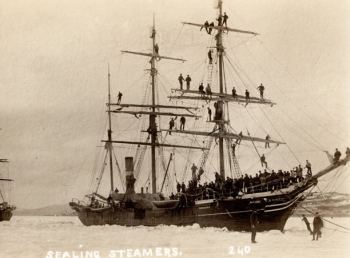
The real Sea Wolf: Russians try to tame ‘Sea Wolf’ Captain Alexander MacLean (Part 2)
After being caught almost red-handed poaching seals from a Russian island, Captain MacLean was summoned, along with most of his crew, to appear aboard the Russian warship Alert. This he complied with, but once aboard the Russian warship, a fight broke out and eventually the Americans were overpowered. A prize crew was then sent to the schooner. According to MacLean, “the American flag was floating at the masthead, and as the halyards were hammed and cut, it was no easy matter to get down. Several attempts were made but were unsuccessful. >click to read< 12:06
The real Sea Wolf: Captain Alexander MacLean (Part 1) – >click to read<






